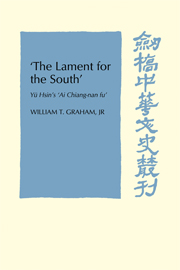Book contents
- Frontmatter
- Contents
- Dedication
- Preface
- Introduction
- 1 The historical background
- 2 The fu in the Six Dynasties
- 3 ‘The Lament for the South’
- 4 Commentary
- Appendix I Historical and biographical sources
- Appendix II Yü Hsin's career
- Appendix III Editions and commentaries
- Appendix IV The date of the ‘Lament’
- Appendix V Yü Hsin and Ssu-ma Ch'ien
- Appendix VI Two Sui shu anecdotes
- Appendix VII Genealogy
- Notes
- Bibliography
- Character glossary
- Index
Appendix VI - Two Sui shu anecdotes
Published online by Cambridge University Press: 04 August 2010
- Frontmatter
- Contents
- Dedication
- Preface
- Introduction
- 1 The historical background
- 2 The fu in the Six Dynasties
- 3 ‘The Lament for the South’
- 4 Commentary
- Appendix I Historical and biographical sources
- Appendix II Yü Hsin's career
- Appendix III Editions and commentaries
- Appendix IV The date of the ‘Lament’
- Appendix V Yü Hsin and Ssu-ma Ch'ien
- Appendix VI Two Sui shu anecdotes
- Appendix VII Genealogy
- Notes
- Bibliography
- Character glossary
- Index
Summary
The ‘Lament’ was much admired from the time of its completion. We can get some indication of its popularity from the fact that two of Yü Hsin's metaphors for contemporary events have made their way into the official histories as if literally true. In both cases, the historian responsible was Wei Cheng (580–643), the chief compiler of the Sui shu.
In line 345 of the ‘Lament’, Yü Hsin says of Hsiao Lun, ‘A hibernating bear injured his horse’. Sui shu 22.23b3–4 duly records that while Lun was on his way to the capital during Hou Ching's rebellion, ‘a hibernating bear all at once came up and bit the horse Lun was riding’. This comes from the ‘Treatise on the Five Elements’, the repository in the official histories for omens and portents. These Sui shu treatises had originally been prepared to accompany the history of the dynasties before the Sui, and that explains how Hsiao Lun can appear in the Sui shu despite his death in 551. Yü's original line had been an allusion, as yet unidentified, used as a metaphor for divine punishment for Lun's crimes. The two lines before it had involved allusions to the First Emperor; it is quite likely that line 345 also refers to another story about the same man, or at least some similar ancient figure surrounded by legends. It is hardly necessary to point out that hibernating bears do not all at once come up and bite one's horse; anyone but a poet had better be prepared to explain the circumstances.
- Type
- Chapter
- Information
- 'The Lament for the South'Yu Hsin's 'Ai Chiang-Nan Fu', pp. 177 - 178Publisher: Cambridge University PressPrint publication year: 1980



